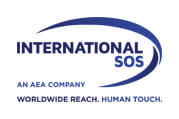Travel Safety Tips for Visitors Ahead of Rugby World Cup
London
International SOS and Control Risks Share Medical and Travel Security Advice

As supporters and businesses countdown to the kick-off of Rugby World Cup 2015, International SOS, the world’s leading medical and travel security risk services company, and Control Risks, the world’s leading global business risk consultancy, share travel safety advice for visitors and match attendees.
Tim Willis, Security Director, Northern Europe at International SOS and Control Risks, says:
“Even though the 2015 Rugby World Cup is taking place in the UK, which is generally considered a low risk destination, travellers can still be exposed to medical and personal security issues. Attendees will likely be shuttling between multiple locations, using public transport, and finding themselves in crowded public spaces. Ensuring 24/7 medical and security care for guests and employees at 13 event venues across England and Wales can be a challenge.”
Fans from all over the world will be enjoying the matches. Rugby World Cup 2015 is expected to attract more international visitors than any previous Rugby World Cup, with an estimate of up to 466,000 international visits according to an economic impact report prepared by Ernst & Young.
Mitigating the security and medical risk exposure of guests, staff, and visitors during Rugby World Cup can help ensure that everyone has a healthy, safe and enjoyable experience.
International SOS and Control Risks share the following information and advice for those travelling to the rugby matches:
- Keep a list of your medication with you at all times. If you have a chronic medical condition, consider a medical alert bracelet.
- Large numbers of people in close proximity give infectious diseases a chance to spread – not only within the UK but also when travellers return to their home countries.
- Ensure your vaccinations, including measles, mumps, chicken pox and flu are up-to-date.
- Be aware of the crowd around you and try and keep away from people who are obviously unwell. Likewise, don’t travel if you are sick.
- Pay attention to routine hygiene: Wash your hands frequently, carry and use hand sanitiser, and avoid touching your face.
- Know how to get in touch with the local emergency services. Emergency services can be activated by dialling 999 or 112 (the United Kingdom and the European Emergency Response numbers respectively).
- Check to see your travel insurance is fit for purpose. Level of cover is important as are the exclusions for any pre-existing conditions or special situations such as alcohol ingestion.
- Plan your journey well in advance if possible and familiarise yourself with the travel arrangements and conditions at destination as each venue will be slightly different.
- Be cautious in crowds, queues and on public transport. The most significant personal safety risk comes from opportunistic street crime such as pick-pocketing, bag-snatching and mugging.
- As in any location, keep an eye on your belongings and keep valuables out of site, or in a safe place in the hotel or at home.
International SOS and Control Risks provide medical, security and travel assistance to organisations attending or sponsoring major international sporting events.
For more information, please visit www.internationalsos.com or email NorthernEurope@internationalsos.com. The Ernst and Young report on the economic impact of Rugby World Cup 2015 is available here.
The words "Rugby World Cup" and the RWC2015 event mark are protected by Trade Mark and/or Copyright. TM © Rugby World Cup Limited 1986-2015. All rights reserved.
About International SOS and Control Risks
Our alliance brings together two of the world’s leading medical and security specialists, International SOS and Control Risks. Our combined resources and expertise are well placed to meet the customers’ growing need for integrated travel security risk services. Our solutions ensure that mobile employees are safe and productive and help employers with their duty of care obligations. 50 dedicated experts, located across the globe with access to over 200 dedicated travel security experts through 26 regional Assistance Centres and a partner network of over 700 accredited providers, produce global travel security information and analysis 24/7. We also provide travel security training, preventative travel assessment, support with the development of travel security risk policies, evacuation plans and the latest technology to enable clients to track and communicate with their mobile employees.

